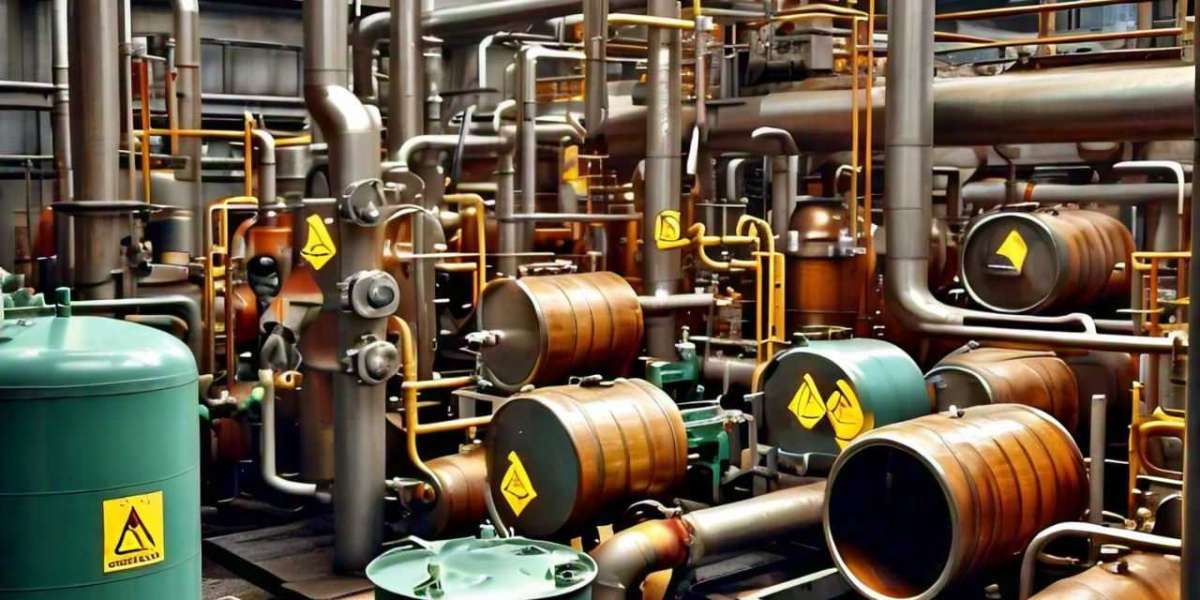Introduction to Industrial Oils
Industrial oils are a critical component in various industrial applications, providing essential lubrication, cooling, and protection to machinery and equipment. They play a vital role in ensuring the smooth operation and longevity of industrial machinery, which is crucial for maintaining productivity and efficiency in the manufacturing sector. But what exactly are industrial oils, and why are they so important?
Types of Industrial Oils
Lubricating Oils
Definition and Function: Lubricating oils are specially formulated to reduce friction between moving parts in machinery. They create a thin film that prevents direct metal-to-metal contact, minimizing wear and tear.
Common Applications: These oils are widely used in engines, gearboxes, and other mechanical systems where friction reduction is essential for efficient operation.
Hydraulic Oils
Definition and Function: Hydraulic oils transmit power in hydraulic systems, which are commonly found in industrial machinery and equipment. These oils need to have excellent fluidity and stability under varying pressure and temperature conditions.
Common Applications: They are used in hydraulic presses, brakes, and steering systems.
Cutting Oils
Definition and Function: Cutting oils, also known as metalworking fluids, are used in machining processes to cool and lubricate the cutting tools and workpieces. This helps to extend tool life and improve the surface finish of the machined parts.
Common Applications: These oils are essential in drilling, milling, and turning operations in the manufacturing sector.
Compressor Oils
Definition and Function: Compressor oils lubricate and cool the internal components of air compressors, ensuring efficient operation and longevity. They also help to seal and reduce leakage in the system.
Common Applications: They are used in various types of compressors, including rotary, reciprocating, and centrifugal compressors.
Turbine Oils
Definition and Function: Turbine oils are designed to lubricate and cool the components of turbines, such as bearings and gears. They need to have excellent thermal and oxidative stability to withstand the high temperatures and pressures in turbine systems.
Common Applications: These oils are used in steam, gas, and hydroelectric turbines.
Transformer Oils
Definition and Function: Transformer oils, also known as insulating oils, are used in electrical transformers to insulate and cool the components. They must have high dielectric strength and thermal conductivity.
Common Applications: They are critical in power transformers, circuit breakers, and capacitors.
Properties of Industrial Oils
Understanding the properties of industrial oils is essential for selecting the right oil for a specific application. Key properties include:
- Viscosity: This is a measure of the oil's resistance to flow. The right viscosity ensures effective lubrication and cooling.
- Thermal Stability: Oils must maintain their properties at high temperatures to prevent breakdown and ensure consistent performance.
- Oxidation Resistance: Oils should resist oxidation to avoid the formation of sludge and varnish, which can impair machinery performance.
- Additive Packages: Additives enhance the base oil properties, providing extra protection against wear, corrosion, and foam formation.
Choosing the Right Industrial Oil
Selecting the appropriate industrial oil involves considering several factors:
- Application Requirements: Different machinery and processes require specific oil properties for optimal performance.
- Manufacturer Recommendations: Always follow the equipment manufacturer's guidelines for oil selection.
- Environmental Considerations: Choose eco-friendly oils when possible to minimize environmental impact.
- Cost Efficiency: Balance the cost of the oil with its performance and longevity to ensure cost-effective maintenance.
The Role of Industrial Oils in Machinery Maintenance
Industrial oils are indispensable in machinery maintenance for several reasons:
- Reducing Wear and Tear: By minimizing friction, industrial oils reduce the wear and tear on moving parts, extending the life of the machinery.
- Enhancing Performance: Proper lubrication ensures that machinery operates efficiently, reducing energy consumption and improving productivity.
- Extending Machinery Life: Regular use of high-quality industrial oils can significantly extend the lifespan of industrial equipment, reducing the need for frequent replacements.
Environmental Impact of Industrial Oils
While industrial oils are essential, they can have environmental impacts if not managed properly:
- Eco-friendly Options: Advances in technology have led to the development of biodegradable and less toxic industrial oils, which are better for the environment.
- Disposal and Recycling: Proper disposal and recycling of used industrial oils are crucial to prevent environmental contamination. Many oils can be re-refined and reused, reducing waste.
Technological Advancements in Industrial Oils
The field of industrial oils is continuously evolving with technological advancements:
- Synthetic Oils: These oils offer superior performance and longer life compared to conventional oils, making them ideal for high-demand applications.
- Bio-based Oils: Made from renewable resources, bio-based oils are an eco-friendly alternative to traditional oils.
- Smart Lubricants: These advanced lubricants incorporate sensors and monitoring technology to provide real-time data on oil condition and machinery performance.
Conclusion
Industrial oils are the unsung heroes of the manufacturing and industrial sectors, playing a critical role in ensuring machinery runs smoothly and efficiently. By understanding the different types of industrial oils, their properties, and how to choose the right one, businesses can improve their operations, extend the life of their equipment, and reduce their environmental impact. With ongoing technological advancements, the future of industrial oils looks promising, offering even more efficient and eco-friendly solutions.
FAQs
1. What are industrial oils used for? Industrial oils are used for lubrication, cooling, and protection of machinery and equipment in various industrial applications. They reduce friction, transfer power, and help maintain efficient operation.
2. How do you choose the right industrial oil? Choosing the right industrial oil involves considering the specific requirements of the machinery, manufacturer recommendations, environmental impact, and cost efficiency.
3. What is the difference between synthetic and conventional industrial oils? Synthetic oils are engineered for superior performance and longer life, while conventional oils are derived from crude oil. Synthetic oils often provide better thermal stability, oxidation resistance, and overall efficiency.
4. How are industrial oils disposed of? Used industrial oils should be collected and disposed of properly to prevent environmental contamination. Many can be re-refined and recycled, reducing waste and promoting sustainability.
5. Can industrial oils be recycled? Yes, many industrial oils can be recycled. Re-refining used oils helps to conserve resources and reduce the environmental impact associated with oil disposal.









